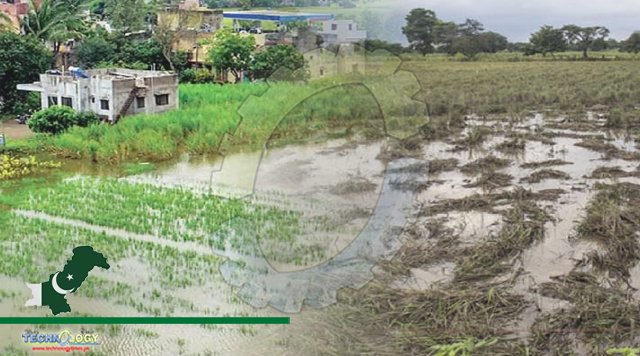In Pakistan 8.3 million acres of crops damaged such as Vegetables, rice, wheat, sugarcane and cotton most impacted by recent climate disaster

The recent flash floods, induced by climate change, have damaged an estimated 8.3 million acres of crops, with over 3.4 million acres of crops being affected in Sindh alone. The floods have also destroyed essential vegetable commodities all over the country. The agriculture sector contributes around 23% to Pakistan’s GDP and 37% to labour force employment.Speaking to The Express Tribune Sindh Abadgar Board (SAB) Vice President, Mahmood Nawaz Shah, said “Vegetables in Sindh are pretty much gone. Fruit trees are a bit tougher. Bananas have also been impacted but the crop has survived,” he added.“Pakistan is already importing tomatoes and onions from Iran and Afghanistan. The major vegetable which Sindh produces and even exports in this season is onion. Vegetables take less time to mature and few areas might start sowing in 15 to 30 days,” Shah explained. According to a report by Taurus Securities, titled ‘Pakistan’s Economy’, “Potato, onion, chillies, tomatoes, gram, rapeseed, mustard, bajra, moong and other fruits and vegetables account for 14% of the agriculture sector output and 40% of the crops segment in terms of GDP contribution.” “Based on historical trends, we estimate the burden of these crop losses will amount to $1.5 billion,” the report highlighted.
Accordingly, the government has issued permits to import 13,000 tons of tomatoes and onions on an immediate basis, to deal with rising prices. The Taurus Securities report emphasised that “sustainable agricultural production ensures healthy farm economics which is a major driver of rural consumption and food security through supplies which also help keep food prices in control. 8.3 million acres of crops damaged, ” Wheat is a major staple crop that is cultivated over 22 million acres across Pakistan. According to the Pakistan Agricultural Storage and Services Corporation (PASSCO), 52,670 tons of wheat in storage have been damaged in Sindh. In total, four billion rupees ($20 million) worth of wheat in storage was lost in Sindh and Balochistan due to the floods. Close to 80% of the cotton produced in Sindh is estimated to have been damaged by the floods, which amounts to a loss of 2.7 million bales, as per the Taurus report. Rain-related cotton crop losses in Punjab have amounted to approximately 6% of the cotton crop—an estimated 464,200 bales so far. Accordingly, latest cotton arrivals have also dropped 14% year on year clocking in at 1.5 million bales as of September 1, 2022. In addition, they have plunged about 33% in Sindh as per data released by the Pakistan Cotton Ginners Association (PCGA). The report also predicted that Pakistan may have to import an additional 3.1 million bales of cotton, at a cost of over $1.2 billion, to fulfil the production gap during FY 2023. Sindh has lost 7% of its total sugarcane crop and an estimated 31% of the rice crop, as per the Taurus report. Taurus Securities Head of Research, Mustafa Mustansir, while speaking to the Express Tribune said, “The agriculture sector needs at least three-six months to be up and running at pre-flood levels.”
Source: This news is originally published by tribune